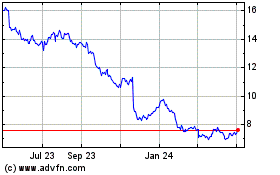Bayer Touts Herbicide Research Discovery -- WSJ
14 February 2020 - 7:02PM
Dow Jones News
By Jacob Bunge
This article is being republished as part of our daily
reproduction of WSJ.com articles that also appeared in the U.S.
print edition of The Wall Street Journal (February 14, 2020).
Bayer AG said its scientists discovered the building block for a
new herbicide, at a time when the company's existing weedkillers
face legal and regulatory challenges.
The German seed-and-pesticide supplier said it identified a
chemical molecule that has proved effective against grasses that
have evolved to survive other herbicides, including Bayer's
Roundup, the world's top-selling weedkiller. Roundup has for years
been losing effectiveness against a rising number of weed species
and is the focus of tens of thousands of lawsuits alleging a cancer
link, which Bayer is contesting.
Bayer and its rivals are racing to identify and develop new
chemical weedkillers after a roughly-three-decade drought in new
herbicide discoveries. A decade might pass before Bayer could
market its discovery as a new herbicide, Bayer said, since it would
require development and regulatory reviews. Bayer said the
discovery nevertheless marks a step toward a valuable new
agricultural tool, after chemical makers and farmers for decades
have relied on existing chemical compounds.
"It's not like anything else that exists in herbicides," said
Dr. Bob Reiter, Bayer's head of agricultural research and
development.
Bayer's $5 billion herbicide business is ensnared in tens of
thousands of lawsuits filed by plaintiffs alleging that Roundup
caused their cancer. The company is contesting those claims,
pointing to safety endorsements by regulatory bodies such as the
U.S. Environmental Protection Agency, which last month again said
Roundup was safe. The company lost the first three cases to go to
trial, however, and some countries, including Germany, have moved
to ban the herbicide.
Rising research costs and lengthier regulatory reviews played
into the lull in developing new herbicides, as did Roundup's rise
to ubiquity in the 1990s. The introduction of crops genetically
engineered to survive Roundup and other weedkillers based on the
active ingredient glyphosate, made it U.S. farmers' default spray
and led to a lapse in new herbicide research, according to a 2019
paper by Colorado State University Prof. Franck Dayan.
As Roundup's use soared, weeds evolved to survive it. Swiss
pesticide maker Syngenta estimates that glyphosate-resistant weeds
will afflict 70% of U.S. soybean fields this year.
Bayer and Corteva Inc., another top seed and chemical supplier,
are marketing new herbicide-and-seed combinations to beat back such
problem weeds.
Those sprays are based on chemical compounds discovered decades
ago, and agricultural researchers have said resistant weeds could
overpower those herbicides too. Bayer's XtendiMax spray, based on
the chemical dicamba and approved for sale in 2016, has been blamed
for drifting across fields and damaging millions of acres of crops.
The company has attributed the majority of complaints to farmers'
own spraying errors.
BASF is preparing to launch this year in Australia what the
company said is a new chemical for killing ryegrass. FMC Corp. in
2019 said that in several years it plans to launch a new herbicide
for rice farmers battling herbicide-resistant weeds.
Bayer's newly identified compound is effective against ryegrass
and other grasses threatening corn and soybean fields, Dr. Reiter
said. Company researchers are working to engineer biotech seeds for
such crops as corn, soybeans and cotton that could resist the
spray. The potential to develop new sprays and biotech seeds
simultaneously was a major factor in Bayer's $63 billion
acquisition of Monsanto in 2018.
While the new herbicide appears to be effective against grasses
that can survive Roundup, Dr. Reiter said it wouldn't replace
Roundup's capacity to kill dozens of weed species.
Write to Jacob Bunge at jacob.bunge@wsj.com
(END) Dow Jones Newswires
February 14, 2020 02:47 ET (07:47 GMT)
Copyright (c) 2020 Dow Jones & Company, Inc.
Bayer Aktiengesellschaft (PK) (USOTC:BAYRY)
Historical Stock Chart
From Mar 2024 to Apr 2024

Bayer Aktiengesellschaft (PK) (USOTC:BAYRY)
Historical Stock Chart
From Apr 2023 to Apr 2024
